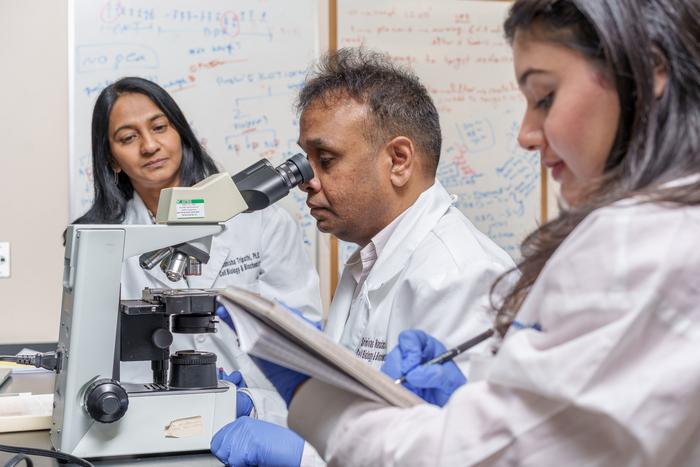A groundbreaking study led by a Texas Tech University Health Sciences Center (TTUHSC) research team has illuminated the molecular underpinnings of prostate cancer, particularly focusing on how certain pathways contribute to treatment resistance. This significant research effort was spearheaded by Dr. Srinivas Nandana and Dr. Manisha Tripathi, both prominent figures in the field of cell biology and biochemistry. Their recent publication in Oncogene represents a pivotal step in combating one of the most aggressive forms of prostate cancer known as castrate-resistant prostate cancer (CRPC).
Prostate cancer is a prevalent malignancy in men, with statistics from the American Cancer Society indicating that nearly one in eight men in the United States will receive a prostate cancer diagnosis in their lifetime. This disease, which accounts for a high mortality rate among men, often progresses to a more advanced stage that is resistant to conventional hormonal therapies. The study conducted by the TTUHSC team delves into the mechanisms driving this resistance, especially the androgen receptor (AR) signaling pathways that are integral to cancer cell proliferation.
The androgen receptor plays a crucial role in the development and progression of prostate cancer, as androgens—hormonal substances that promote masculine traits—bind to this receptor to stimulate cancer cells’ growth. Unfortunately, many patients exhibit resistance to androgen receptor signaling inhibitors after initial successful therapy, which leads them to develop CRPC. The TTUHSC researchers aimed to dissect the molecular processes that facilitate this transition, ultimately discovering critical insights into the signaling switch from the androgen receptor to the glucocorticoid receptor, another pathway leveraged by cancer cells to evade treatment.
A highlight of their research was the identification of TBX2, a transcription factor that is overexpressed in CRPC. The researchers hypothesized that TBX2 might be a driving force behind the cancer’s resistance to androgen therapy. Their findings confirmed that TBX2 acts as a switch, redirecting signaling pathways away from the androgen receptor towards the glucocorticoid receptor. This unexpected discovery suggests that cancer cells could minimize the efficacy of existing therapies by simply tapping into alternative signaling routes that are not directly targeted by current drugs.
The researchers conducted a comprehensive experimental study, observing that by inhibiting TBX2, they could disrupt the growth signals that cancer cells depend on. These insights led to the identification of a potential therapeutic strategy aimed at preventing this detrimental switch in signaling pathways. Disrupting the protein complex with which TBX2 interacts could pave the way for new treatments that help restore sensitivity to existing therapies while potentially minimizing side effects associated with more aggressive interventions targeting the glucocorticoid receptors directly.
In addition, the study offered critical correlations between TBX2 activity and the paths through which the androgen and glucocorticoid receptors operate. By analyzing tissue from CRPC patients, the research team discovered a pairwise relationship that could assist in early identification of patients at higher risk for developing resistant forms of prostate cancer. Knowing this could lead to preemptive therapeutic strategies that tailor treatment approaches with the aim of mitigating the switch before it takes hold in the cancer progression timeline.
Dr. Nandana emphasized the importance of their findings, stating that understanding the interplay of TBX2, androgen receptor, and glucocorticoid receptor proteins could lead to predictive models for determining patient risk levels for CRPC. The research not only opens avenues for targeting early-stage patients but also reshapes the framework under which clinicians might select treatment regimens for patients already battling advanced prostate cancer.
The funding for this vital research was secured from prominent institutions, including the U.S. Department of Defense and the Cancer Prevention Research Institute of Texas, demonstrating a broad commitment to fighting cancer. This cross-collaborative approach involved contributions from both medical and informatics specialists, indicating a shift towards more integrative research methodologies in oncology focused on bespoke patient management strategies.
By offering new insights into the underlying mechanisms of prostate cancer therapeutics, TTUHSC researchers recognize that significant challenges remain in the fight against this disease. Their approach to reconstructing the treatment paradigm mirrors ongoing efforts to understand cancer biology more comprehensively. As they move forward, the focus will be on developing innovative models and drugs that specifically target the TBX2-mediated switch, a strategy that could dramatically improve treatment outcomes for a patient population that currently has limited options.
In summary, the research conducted by Dr. Nandana, Dr. Tripathi, and their team provides a crucial educational point in the field of prostate cancer treatment. As cancer research evolves, studies like this one contribute necessary knowledge that not only aids in developing new pharmaceuticals but also helps fine-tune existing treatment protocols to create more effective, less invasive treatment options for patients suffering from this formidable disease.
Subject of Research: Prostate Cancer
Article Title: A TBX2-Driven Signaling Switch From Androgen Receptor to Glucocorticoid Receptor Confers Therapeutic Resistance in Prostate Cancer
News Publication Date: 20-Dec-2024
Web References: DOI
References: N/A
Image Credits: TTUHSC
Keywords: Prostate cancer, Androgen signaling, Glucocorticoid receptors, Cancer research, Therapeutic resistance




